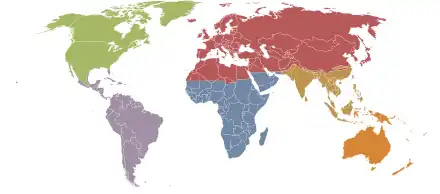Miklos Udvardy
Miklos Dezso Ferenc Udvardy (March 23, 1919–January 27, 1998) was a biologist and university instructor of Hungarian-American nationality. He made significant contributions to various fields, including biogeography, evolutionary biology, ornithology, and vegetation classification. Throughout his career, Udvardy published 191 papers, authored 8 books, and created 3 maps that have been recognized in the scientific literature.
Miklos Dezso Ferenc Udvardy | |
|---|---|
| Born | 23 March 1919 |
| Died | 27 January 1998 (aged 78) Sacramento, California, United States |
| Scientific career | |
| Fields | Biology, biogeography, and ornithology |
Early life and career
Udvardy was born on March 23, 1919, in Debrecen, Hungary, to a family of noble descent. His father, Miklos Udvardy de Udvardy et Básth, held a noble title, and his mother was Elizabeth Komlossy de Komlos. Although Udvardy initially developed an interest in birds, his father encouraged him to pursue a legal education. However, he eventually obtained a doctorate in biology from the University of Debrecen in 1942. He began his career as a research biologist at the Tihanyi Biological Station, located on Lake Balaton in western Hungary.
In 1948, Udvardy left Hungary and obtained a postdoctoral fellowship at Helsinki University in Finland under the guidance of Professor Pontus Palmgren, an esteemed ornithologist and zoologist. It was during this time that he met his future wife, Maud Björklund, in 1950. Subsequently, Udvardy relocated to Uppsala, Sweden. He briefly served as the curator of marine invertebrates at the Swedish Museum of Natural History in Stockholm.
Later career
Miklos and Maud were married in 1951 and immigrated to Canada. In 1952, Udvardy joined the University of British Columbia in Vancouver, British Columbia, where he assumed the position of assistant professor in the department of zoology. From 1953 to 1966, he taught courses on comparative anatomy and ornithology and held the position of assistant professor. During the academic year 1958–1959, he served as a visiting professor at the University of Hawaii, and in the academic year 1963–1964, he was the Lida Scott Brown Lecturer in Ornithology at the University of California, Los Angeles.
Between 1967 and 1991, Udvardy served as a professor of biological sciences at California State University, Sacramento (CSUS). During his time there, he supervised the work of eight graduate students and spent a year as a visiting professor at the University of Bonn in Germany. He also served as a Fulbright lecturer at the National Autonomous University of Honduras for one year. Udvardy mentored a diverse group of graduate students, including Peter Grant at Princeton University, Jean Bedard at Université Laval in Quebec, Spencer Sealy at the University of Manitoba, Kees Vermeer at the Canadian Wildlife Service, and Raymond Pierotti at the University of Kansas. At CSUS, he taught various subjects such as biogeography, evolution, ornithology, and speciation. In honor of his contributions, a graduate student award was established at CSUS bearing his name.

Udvardy's work in biogeography was highly influential, and his system of biogeographic realms remains widely used today. His Map of the Biogeographic Provinces of the World made a significant impact in the field of biogeography. Through collaboration with UNESCO, he produced a significant conservation document titled "A Classification of the Biogeographic Provinces of the World," intended to complement the map.
Although Udvardy developed the concept of competitive exclusion, he did not use the term that later became associated with the idea, resulting in his contribution being less widely recognized. He was among the first to emphasize the role of human activities in species dispersal and the introduction of species to new environments, highlighting the potential consequences of such actions. Udvardy coined the term "zoogeography" to describe the study of animal distribution and authored the book "Dynamic Zoogeography" on the subject.
Miklos Udvardy passed away in Sacramento, California, on January 27, 1998, due to surgical complications. He was survived by his wife Maud, their three children, and two grandchildren.
See also
- Alfred Russel Wallace, who also played a large role in developing the idea of biogeographic realms